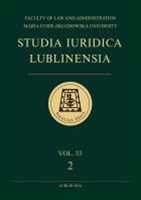Legal and Constitutional Aspects of the Triple Union: On the History of Federalism in East-Central Europe in the Modern Era
Legal and Constitutional Aspects of the Triple Union: On the History of Federalism in East-Central Europe in the Modern Era
Author(s): Jerzy MalecSubject(s): Cultural history, History of Law, Political history, Social history, Sociology of Law
Published by: Wydawnictwo Naukowe Uniwersytetu Marii Curie-Sklodowskiej
Keywords: Triple Union; federalism; Polish-Lithuanian Commonwealth; personal union;
Summary/Abstract: The history of European federalism, including associations of union in which the Polish-Lithuanian Commonwealth participated, has recently become particularly topical. Quite a lot was written about it, in particular the Polish-Lithuanian Union linking the two states over several centuries. Whereas relatively little is known about the history of attempts made in the early modern era to create a power in Central and Eastern Europe based on a union of states that were particularly important in the region at the time. This idea of a union was to unite three states: Poland, Lithuania and Russia, hence the name Triple Union (Pol. unia troista), was first outlined in 1572. It was then renewed at three successive elections until 1587. It was also current during the reign of Sigismund III Vasa, until 1613, when Mikhail Romanov ascended the Moscow throne, starting a new dynasty. With the election of Romanov as Tsar, the project of the Triple Union was abandoned, although Vladislav IV still laid claim to the Moscow throne for a dozen or so years (until 1634), but these claims no longer had any great practical significance and were finally abandoned. Plans for a union advanced by the Polish side often referred to the solutions applied in the earlier acts of union between the Kingdom of Poland and the Grand Duchy of Lithuania. This testifies to a strongly developed federalist practice which was characteristic of the Commonwealth, and was at the same time implemented in its own peculiar way. Undoubtedly, the greatest impact on the negotiations was exerted by the Union of Lublin which at that time was still quite recent. Its provisions, and at the same time the positive effects that is provided for both nations, likely shaped the consciousness of the nobility during the preparation of subsequent diplomatic missions to Moscow. The idea of a Triple Union was undoubtedly one of the boldest political projects of the era. Although it is true, that the concept of the Triple Union remained only in the sphere of projects, it was nevertheless of great importance in the 16th and 17th centuries. However, no dedicated study has yet appeared that would comprehensively present its development, content and significance. This article is an attempt to even partially fill this gap in Polish historiography
Journal: Studia Iuridica Lublinensia
- Issue Year: 33/2024
- Issue No: 2
- Page Range: 201-221
- Page Count: 21
- Language: English

